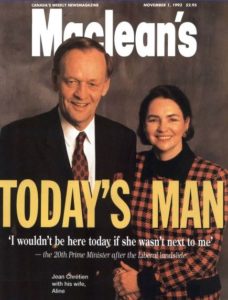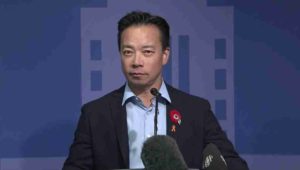
ABC Vancouver Mayor, Ken Sim
What is it with men who lack humility, intellectual heft, or have little character and no experience, and their unwholesome mistreatment of women?
In the case of Mayor Ken Sim, perhaps there is a partial answer to the multiple questions above, deriving from Mr. Sim’s use of the word “swagger”.
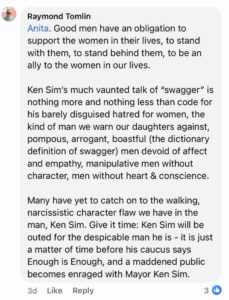 Social media response to former Park Board Chairperson, Anita Romaniuk
Social media response to former Park Board Chairperson, Anita Romaniuk
A Definition of Swagger
Pompous, arrogant, boastful. An insolent braggart, and from the definition of insolent: disrespectful, rude, insulting in manner and speech, and deviant.
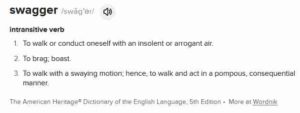
Swagger. Think: that jerk on the beach in a too small swimsuit who believes he’s God’s gift to women, who moves with a near drunken stagger, on the prowl for a victim of his all-too-visible misogyny and disdain for women, a man who is lacking in fidelity of purpose, and a little man devoid of empathy, and humanity.
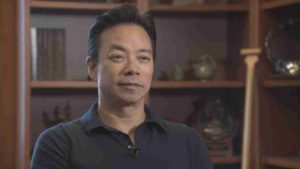
Mayor Ken Sim, the next time he uses the word swagger, think: misogynist, arrogant, pompous, lacking in character, intellect and empathy, boastful, braggart, rude, scornful, with no conscience.
Under the current provincial Police Act, the Mayor of Vancouver upon election becomes the de facto Chairperson of the Vancouver Police Board.

Faye Wightman led several high-profile agencies before Solicitor General Mike Farnworth appointed Ms. Wightman, a well-respected and accomplished member of our community, to the Vancouver Police Board, in September 2020.
In past years, dating back to 1990, Ms. Wightman served as CEO of the Vancouver Foundation, CEO of B.C. Children’s Hospital Foundation, vice-president of the University of Victoria, Board Chair of Inspire Health, and interim CEO of the Canadian Cancer Society, appointed as a B.C. Housing Commissioner, and Coast Capital Savings Executive Director.
“The Vancouver Police Board is guided by the values of independence, fairness, objectivity and accountability in all that it does,” Faye Wightman wrote in a statement she issued last week, following her resignation from the Police Board. “I believe Police Board Chair Ken Sim, and certain directors of the Board have lost sight of these key values, and I resigned.”
Faye Wightman’s departure comes less than a year after Police Board member Rachel Roy resigned in June 2023. Stephanie Johanssen also lost her job as Executive Director in November 2022, after serving three years and seven months in the role. Note should be made that Ms. Johanssen’s departure came the same month Mr. Sim and his ABC Vancouver majority Council were sworn into office.

From Mike Howell’s Glacier Media story: “The Vancouver Police Board won’t say why its Executive Director Stephanie Johanssen (far right) is no longer on the job.” File photo Mike Howell.
In a follow-up interview with Glacier Media’s Mike Howell, Ms. Wightman states …
“If the Board is comprised of directors who have a professional reliance on the City of Vancouver for funding, or on maintaining a positive relationship with the Mayor, who also chairs the Police Board, then their objectivity is compromised,” Ms. Wightman said in her statement.
“That is the case with two of our directors at the [police board] and it was becoming clear they were in a position of conflict.”
Ms. Wightman also named Trevor Ford, the Mayor’s Chief of Staff, when asked about her allegation of interference from Mayor Ken Sim’s staff.
“[Trevor Ford] came to an in-camera meeting, he phoned and directed Board members to fire the Executive Director,” Ms. Wightman alleged in the interview.
“He sat in on one-on-one meetings that the Mayor had with individual Board members. If that’s not political interference, I’m not sure what is.”
Vancouver Police Board Executive Director Stephanie Johanssen, Board member Rachel Roy and now Faye Wightman, who has stated that “Ken Sim, from the outset and throughout our tenure together on the Police Board repeatedly asked for my resignation.”
Gone.
Harassment of Ms. Wightman? Political inference from the Mayor’s Chief of Staff in the firing of Police Board Executive Director, Stephanie Johannsen?
VanRamblings, in reading Ms. Wightman’s statement, believes so, yes.
Readers. Do you notice a pattern?
Could it be that Mayor Ken Sim demanded the resignation of the three strong women of accomplishment written about above because Vancouver’s current Mayor finds strong women of character, integrity and accomplishment threatening, and as such they must be excised from his circle of influence?
Not to worry, though.

Although B.C. Solicitor General Mike Farnworth has been uncharacteristically silent following the resignation of Ms. Wightman as his chosen appointee to the Vancouver Police Board, fear not …
Premier David Eby in his GlobalBC interview on Police Act reforms, states …
“I understand there’s some concern in Vancouver right now. The reforms (to the Police Act) are clearly needed. We’ll be working with local governments, and with police and the public in terms of the changes that are coming forward. The Solicitor General’s office is working on it right now.”
GlobalBC reporter Catherine Urquhart ends her report, stating …
“Legislation changing the Police Act to remove Mayors from police boards is expected to come as early as the spring session.”
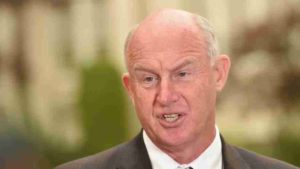
British Columbia Solicitor General Mike Farnworth keeping his powder dry. Buh-bye, Mayor Ken Sim.
Solicitor General Farnworth’s silence thus far = revenge is a dish best served cold.



